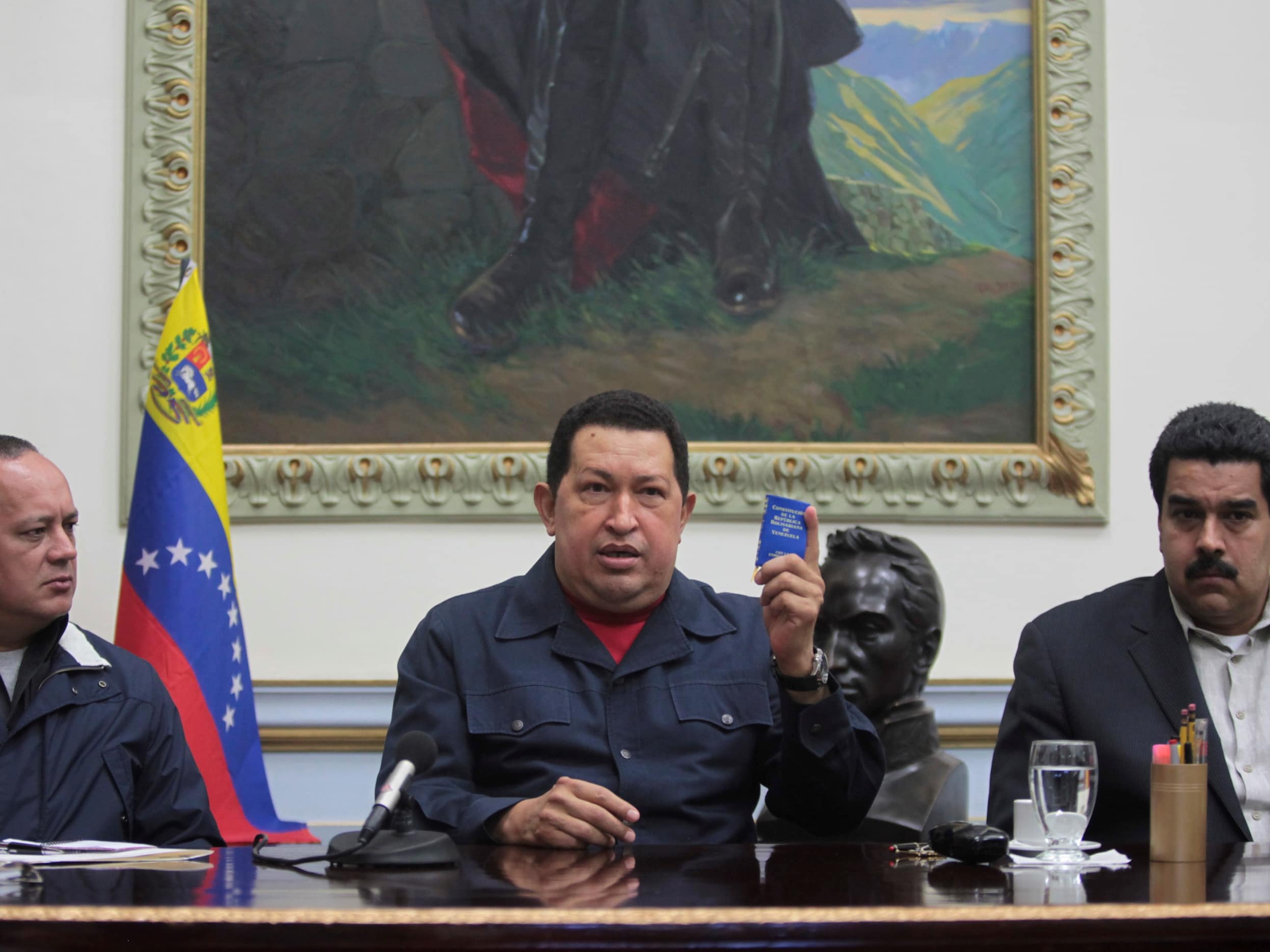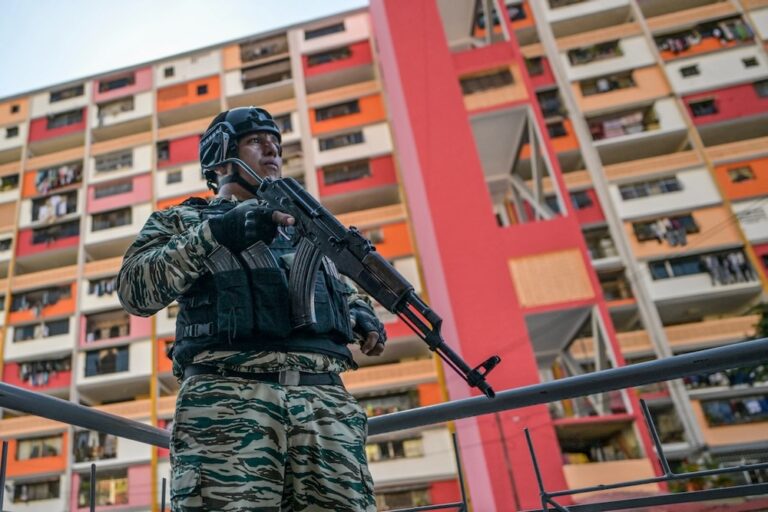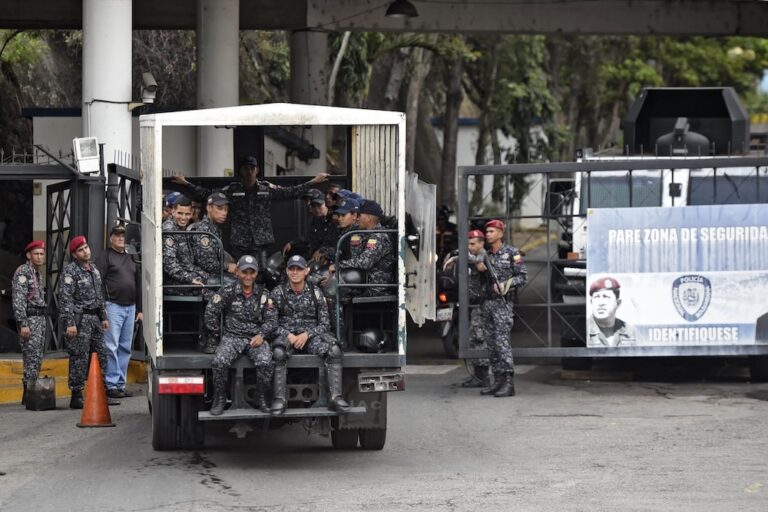Hugo Chávez’s presidency (1999-2013) was characterised by a dramatic concentration of power and open disregard for basic human rights guarantees, says Human Rights Watch.
(Human Rights Watch/IFEX) – Hugo Chávez’s presidency (1999-2013) was characterized by a dramatic concentration of power and open disregard for basic human rights guarantees, Human Rights Watch said today [5 March 2013].
After enacting a new constitution with ample human rights protections in 1999 – and surviving a short-lived coup d’état in 2002 – Chávez and his followers moved to concentrate power. They seized control of the Supreme Court and undercut the ability of journalists, human rights defenders, and other Venezuelans to exercise fundamental rights.
By his second full term in office, the concentration of power and erosion of human rights protections had given the government free rein to intimidate, censor, and prosecute Venezuelans who criticized the president or thwarted his political agenda. In recent years, the president and his followers used these powers in a wide range of prominent cases, whose damaging impact was felt by entire sectors of Venezuelan society.
Many Venezuelans continued to criticize the government. But the prospect of reprisals – in the form of arbitrary or abusive state action – forced journalists and human rights defenders to weigh the consequences of disseminating information and opinions critical of the government, and undercut the ability of judges to adjudicate politically sensitive cases.
Assault on Judicial Independence
In 2004, Chávez and his followers in the National Assembly carried out a political takeover of Venezuela’s Supreme Court, adding 12 seats to what had been a 20-seat tribunal, and filling them with government supporters. The packed Supreme Court ceased to function as a check on presidential power. Its justices have openly rejected the principle of separation of powers and pledged their commitment to advancing Chávez’s political agenda. This commitment has been reflected in the court’s rulings, which repeatedly validated the government’s disregard for human rights.
Lower-court judges have faced intense pressure not to issue rulings that could upset the government. In 2009, Chávez publicly called for the imprisonment of a judge for 30 years after she granted conditional liberty to a prominent government critic who had spent almost three years in prison awaiting trial. The judge, María Lourdes Afiuni, was arrested and spent more than a year in prison in pretrial detention, in deplorable conditions. She remains under house arrest.
Assault on Press Freedoms
Under Chávez, the government dramatically expanded its ability to control the content of the country’s broadcast and news media. It passed laws extending and toughening penalties for speech that “offends” government officials, prohibiting the broadcast of messages that “foment anxiety in the public,” and allowing for the arbitrary suspension of TV channels, radio stations, and websites.
The Chávez government sought to justify its media policies as necessary to “democratize” the country’s airwaves. Yet instead of promoting pluralism, the government abused its regulatory authority to intimidate and censor its critics. It expanded the number of government-run TV channels from one to six, while taking aggressive steps to reduce the availability of media outlets that engage in critical programming.
In response to negative coverage, Chávez repeatedly threatened to remove private stations from the airwaves by blocking renewal of their broadcast licenses. In 2007, in an act of blatant political discrimination, his government prevented the country’s oldest private television channel, RCTV, from renewing its license and seized its broadcasting antennas. Three years later, it drove RCTV off cable TV as well by forcing the country’s cable providers to stop transmitting its programs.
The removal of RCTV left only one major channel, Globovisión, that continued to be critical of the president. The Chávez government repeatedly pursued administrative sanctions against Globovisión, which have kept the station in perpetual risk of suspension or closure. It also pressed criminal charges against the station’s president, a principal owner, and a guest commentator after they made public statements criticizing the government.
The sanctioning and censorship of the private media under Chávez have had a powerful impact on broadcasters and journalists. While sharp criticism of the government is still common in the print media, on Globovisión, and in some other outlets, the fear of government reprisals has made self-censorship a serious problem.
Rejection of Human Rights Scrutiny
In addition to neutralizing the judiciary as a guarantor of rights, the Chávez government repudiated the Inter-American human rights system, failing to carry out binding rulings of the Inter-American Court of Human Rights and preventing the Inter-American Commission on Human Rights from conducting in-country monitoring of human rights problems. In September 2012, Venezuela announced its withdrawal from the American Convention on Human Rights, a move that leaves Venezuelans without recourse to what has been for years – in countries throughout the region – the most important external mechanism for seeking redress for abuses when national courts fail to provide it.
The Chávez government also sought to block international organizations from monitoring the country’s human rights practices. In 2008, the president had representatives of Human Rights Watch forcibly detained and summarily expelled from the country after they released a report documenting his government’s violation of human rights norms. Following the expulsion, his then-foreign minister and now chosen successor, Nicolás Maduro, announced that, “Any foreigner who comes to criticize our country will be immediately expelled.”
Under Chávez, the government also sought to discredit human rights defenders by accusing them of receiving support from the US government to undermine Venezuelan democracy. While local nongovernmental organizations have received funding from US and European sources – a common practice in Latin America where private funding is scarce – there is no credible evidence that the independence and integrity of the defenders’ work has been compromised by international support. Nonetheless, in 2010, the Supreme Court ruled that individuals or organizations receiving foreign funding could be prosecuted for “treason.” The National Assembly passed legislation prohibiting organizations that “defend political rights” or “monitor the performance of public bodies” from receiving international funding. It also imposed stiff fines on organizations that “invite” to Venezuela foreigners who express opinions that “offend” government institutions.
Embracing Abusive Governments
Chávez also rejected international efforts to promote human rights in other countries. In recent years, Venezuela consistently voted against UN General Assembly resolutions condemning abusive practices in North Korea, Burma, Iran, and Syria. Moreover, Chávez was a vocal supporter of Syria’s Bashar al-Assad, Libya’s Muammar Gaddafi, and Iran’s Mahmoud Ahmadinejad, bestowing upon each of these leaders the “Order of the Liberator,” Venezuela’s highest official honor.
Under Chávez, Venezuela’s closest ally was Cuba, the only country in Latin America that systematically represses virtually all forms of political dissent. Chávez identified Fidel Castro – who headed Cuba’s repressive government until his health deteriorated in 2006 – as his model and mentor.



